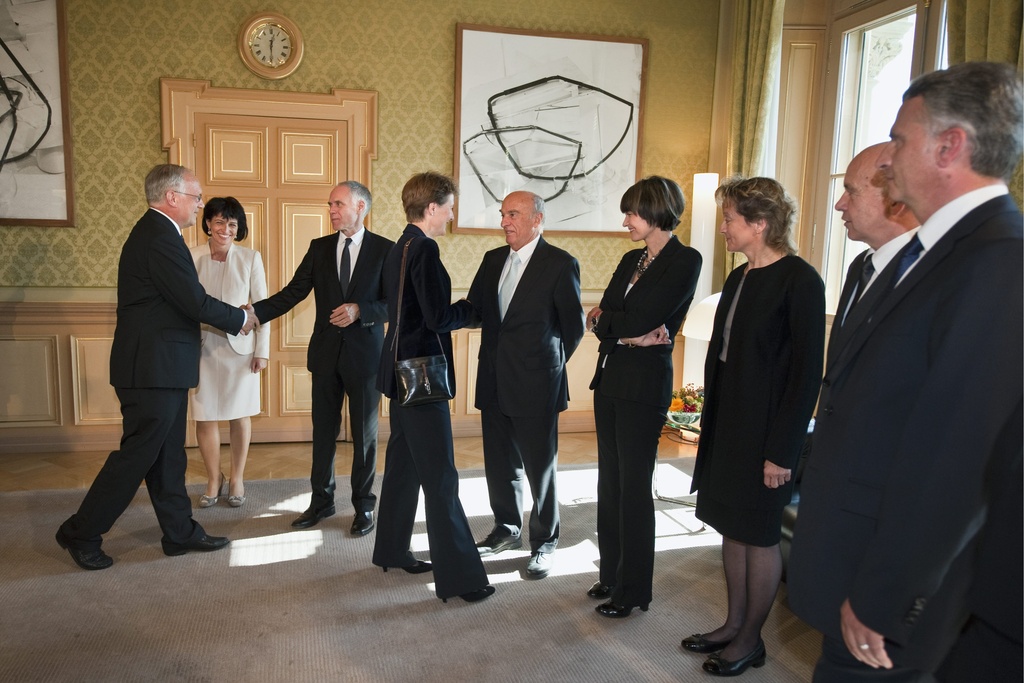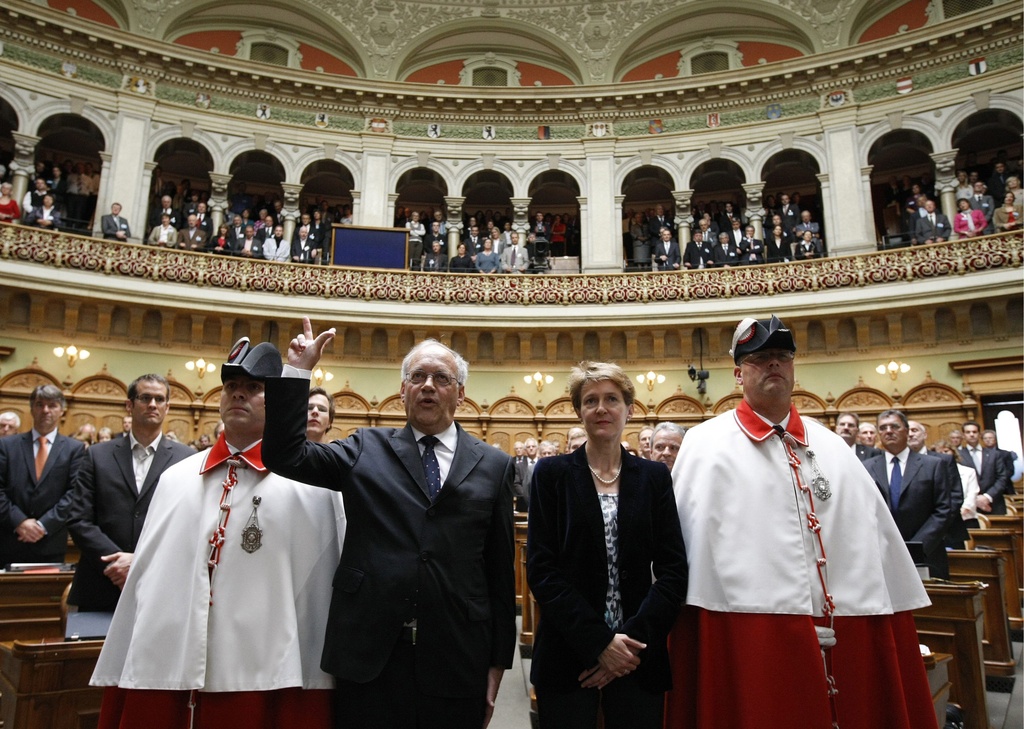Power shared beyond cabinet inner circle

Tensions have risen among the members of the Swiss cabinet after the ministries were redistributed last week, with the centre-right calling the shots.
But if the other parties represented in the government have complained about the situation, the effects may be less important than the public believe.
The centre-left Social Democratic Party said they were betrayed after last Monday’s decisions, while the rightwing Swiss People’s Party reckoned the centre-right parties – the Christian Democrats and the Radicals – were trying to keeps their hands firmly on the levers of power.
Normally, ministries are distributed based on time served in cabinet, but this time the Social Democrats were shut out of the process and left with foreign affairs and justice, two ministries considered less influential.
The People’s Party called the cabinet redistribution “irresponsible”, adding that changing the heads of four ministries just one year before general elections was a political “coup”.
The Social Democrats said it was a demonstration of strength. “The centre-right parties, which have around 30 per cent of the vote and 76 out of 200 seats in the House of Representatives, now hold the key ministries, way out of proportion compared with their electoral strength,” it wrote in a press release.
The centre-left party pointed the finger of blame in particular at President Doris Leuthard, a Christian Democrat who it said was more interested in defending her personal interests, her party and the Swiss Business Federation.
Political analysts agree these parties have a point. “Deciding who gets a ministry is nothing minor, because there are some ministries where your influence on the course of politics is more important,” Wolf Linder from Bern University told swissinfo.ch.
“Parties want their cabinet representatives to hold down ministries that correspond to their political affinities,” added Iwan Rickenbacher, an honorary professor of politics at the same university and former secretary general of the centre-right Christian Democrats.
Final say
It raises the question of just who has the final say in Swiss politics. Linder and Rickenbacher agree that various lobbies and groups share power in Switzerland.
Besides the government, they say power is held by the administration, parliament, some politicians, various associations as well as voters under the country’s system of direct democracy.
The public generally overestimates the government’s real power, according to Rickenbacher. He says that, if anything, government power resides in the fact that cabinet can set the timing of the political agenda.
“With closer ties to the rest of Europe and globalisation, where international agreements become more important, the executive branch becomes more powerful in Switzerland too,” Linder added.
“Parliament cannot influence international treaties like it can legislation; it can only accept or reject them.”
More influence
The administration has also gained more influence, say both specialists. It guarantees stability while politicians don’t always follow a straight course, according to Linder.
“The key personnel in the ministries are the heads of federal offices and the general secretaries,” Rickenbacher explained. “How powerful they are depends on their minister’s leadership style.”
As to the influence of parliament, the two political scientists don’t quite agree. While Rickenbacher considers it to be rather limited because most politicians have other careers, Linder reckons its power to be equivalent to that of the cabinet.
The question remains of how influential the economy is, given the number of its representatives with seats in parliament. Rickenbacher, who spends part of his time in the Swiss capital Bern working as a lobbyist, does nothing to counter this idea.
“In our system, the most influential lobbyists are those parliamentarians who can defend the interests of associations in various commissions and who are often on the payroll of those associations,” he told swissinfo.ch.
The larger organisations have a strong political influence, he added. “It is significant that the most important associations – the employers, the farmers and the unions – are older than the parties themselves.”
Linder reckons this influence is variable. “The pharmaceutical industry can defend its interests far better than the farmers. The export industry has also become more influential while unions have lost some of their impact.”
Confidential talks
Business leaders and politicians also meet regularly, sometimes secretly. This doesn’t have a particular influence on the course of Swiss politics, according to Rickenbacher.
“Talks are usually focused on general rather than specific topics and involve the current situation,” he said.
Linder says there is no reason not to hold these talks. “What bothers me is that they are often confidential and no one knows what was actually discussed,” he said.
Rickenbacher and Linder are convinced though that voters have the final say in Switzerland thanks to direct democracy. Linder says this is because it forces parties to work together even if they don’t always agree.
“They need to reach an agreement if they want to find a majority capable of winning nationwide votes,” he pointed out.
Rickenbacher agrees that voters are an important element in Swiss politics. “Voters are aware of their power and proud of it,” he said.
Doris Leuthard left the economics ministry to take over the mammoth environment, transport, energy and communications ministry from Social Democrat Moritz Leuenberger (retiring)
Eveline Widmer-Schlumpf (Conservative Democratic Party) left the justice ministry to replace Hans- Rudolf Merz (Radical, centre-right, retiring) at the helm of the finance ministry.
Johann Schneider-Ammann (Radical, new) will take over the economics ministry.
Simonetta Sommaruga (Social Democrat, new) inherits the justice ministry.
Micheline Calmy-Rey (Social Democrat) stays put at the foreign ministry, as does Ueli Maurer (Swiss People’s Party, defence) and Didier Burkhalter (Radical, interior).
(Adapted from German by Scott Capper)

In compliance with the JTI standards
More: SWI swissinfo.ch certified by the Journalism Trust Initiative














You can find an overview of ongoing debates with our journalists here . Please join us!
If you want to start a conversation about a topic raised in this article or want to report factual errors, email us at english@swissinfo.ch.